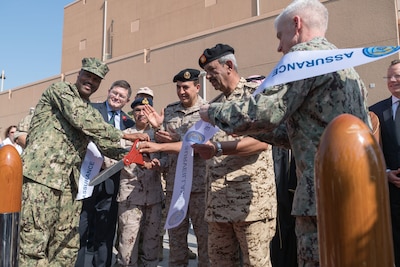
MANAMA, Bahrain , Nov. 7, 2019 —
International partners gathered to celebrate the opening of Coalition Task Force (CTF) Sentinel’s new command center at Naval Support Activity, Bahrain Nov. 7.
“Today, we reach two significant milestones in the standing up of the CTF Sentinel headquarters under the International Maritime Security Construct and the introduction of the CTF’s first appointed commander, Rear Adm. Alvin Holsey,” said Vice Adm. Jim Malloy, commander of U.S. Naval Forces Central Command, U.S. 5th Fleet and Combined Maritime Forces.
Participants from Australia, Bahrain, Kingdom of Saudi Arabia, United Arab Emirates, United Kingdom and United States joined together at the ceremony to show their commitment to the international rules-based system.
Malloy welcomed the newest member of the IMSC, Albania, which joined Nov. 1.
The IMSC was established to deter malign activity, promote maritime security and stability, and ensure freedom of navigation and free flow of commerce in international waters throughout the Arabian Gulf, Strait of Hormuz, the Bab el-Mandeb Strait and the Gulf of Oman.
“Standing up CTF Sentinel is an important multinational maritime effort to increase surveillance of and security in key waterways in the Middle East to ensure freedom of navigation in light of recent events in the Arabian Gulf,” said Malloy.
Increased threats in critical waterways, mine attacks on international shipping, attacks on Saudi oil facilities, the shooting down of a U.S. drone and seized international shipping are recent examples, Malloy said.
“The command center will be a central hub to enable coordination of the information gathered from our navies and partners in industry to create a shared operating picture, and expanding our maritime domain awareness,” said Malloy. “This will then inform naval operations, directed from this headquarters, that ensure stability in the region through vigilance, surveillance, and assurance under the IMSC.”
Large naval vessels (Sentinels) such as frigates and destroyers provide over watch of critical choke points, while smaller naval vessels (Sentries) such as patrol craft and corvettes patrol the key transit lanes between them. In addition, airborne surveillance assets monitor the flow of traffic through the highest risk areas, collectively providing a persistent presence in the area.
“Standing together today shows the power of nations united in support of a common mission in response to a demonstrated threat. All of the coalition partnerships forged over the last 20 years in the region has made it possible to stand up this deterrent force in such a short time,” said Malloy.



